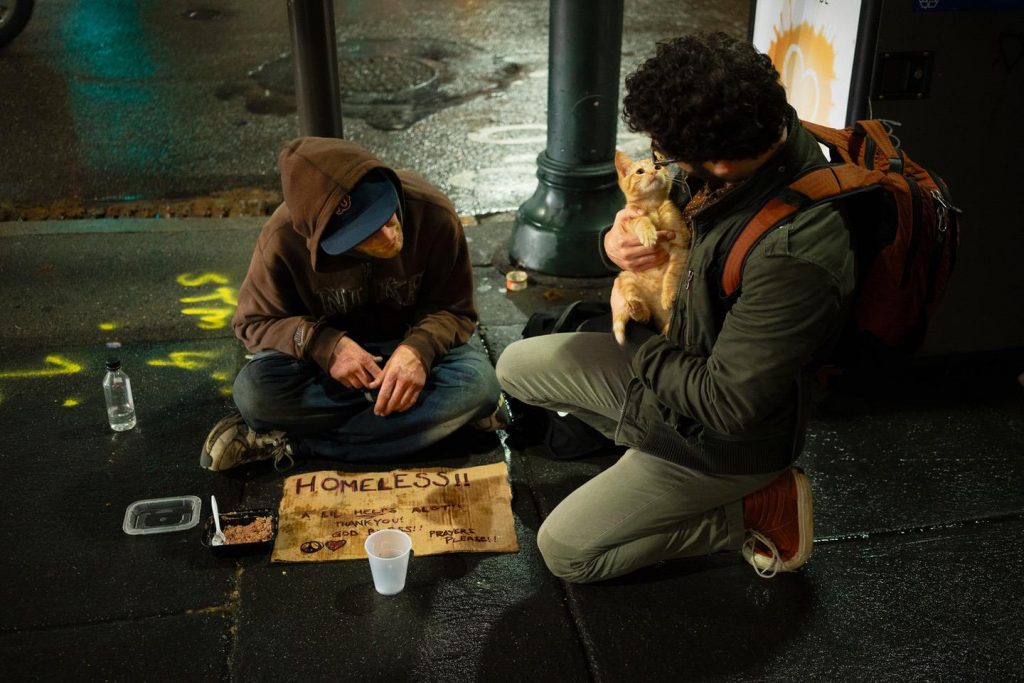
It is not hard to visualize the scene. It is a banquet with the worst of the lot – drunkards, womanizers and traitors. Jesus arrives. But instead of preaching from the street against the sinfulness this group embodies, He goes in, sits down and begins eating a meal with them. The Pharisees look on, wondering how it can be that a known teacher can so willingly contaminate himself by sitting and eating with the unclean.
Of course, the Pharisees do not know the heart condition of the guests. They call the group “sinners”, but how sinful is someone who has just been redeemed? After all, it is probable that many of them were being renewed in spirit right there on the spot. They came to Matthew’s place to rejoice with Matthew that he met Jesus, and now they are meeting Jesus too! But while the guests listen to Jesus speak of the Father’s forgiveness, the Pharisees stand off and sneer. In their eyes, Jesus is sitting among the diseased, and eating from the same table.
Being offended, the Pharisees should’ve waited and asked Jesus privately what he was doing and why. But instead they speak to his disciples. Probably out of a heart that wants others to see Jesus as discredited as he is in their eyes.
On His part, when Jesus finds out what they wondered, He straight to the source, “On hearing this, Jesus said, “It is not the healthy who need a doctor, but the sick. But go and learn what this means: ‘I desire mercy, not sacrifice.’ For I have not come to call the righteous, but sinners.”
Jesus’ comments are biting and sharp to the Pharisee’s ears. First He pokes at the gaping chasm between how the Pharisees talk and how they act. He quotes a Greek proverb about only the sick needing doctors, implying that the Pharisees (who saw themselves as healthy in their walk with God) should’ve been ministering to “the sick” if that’s really how they saw it. Then He pokes at their religious ignorance, using a phrase that religious teachers would commonly use with brand new students, “But go and learn what this means.” He couples that phrase with an ironic quote from Hosea (“I desire mercy, not sacrifice.”), a prophet who was called of God to marry a prostitute as a blunt and scandalous object lesson of how God had to deal with Israel.
Even more to His point, the actual Scripture in Hosea is the summary point of the book, a central point in Micah 6, and an allusion to Samuel’s prophetic judgment of Saul (see 1Sam 15:22). God’s focus on mercy and obedience over ritualistic observance is something that every student of the Scripture ought to have known well. That Jesus reminds them of such a basic Scriptural point would not be unlike telling an experienced math teacher how to multiply two digit numbers. The irony is thick, and it would not be lost on the Pharisees.
Altogether, it is a very pointed rebuke indeed.
Jesus concludes His sharp remarks by reminding Israel’s religious leaders of God’s mission: The whole point of a chosen people is that they might represent God to the rest of the world, so that all nations would know Him! And that is a lesson we who are Christ’s disciples must not miss. To stand off and criticize Jesus (or one of His disciples) for doing exactly what you are supposed to be doing is the very height of spiritual dullness and pitiful ignorance.
Those that oppose and disquiet gracious and good men are enemies to their own good; they cut the bough which they stand on; they labour to pull down the house that covers themselves, being blinded with malice and a diabolical spirit. Take heed of such a disposition. It comes near to the sin against the Holy Ghost to hate any man for goodness.
Richard Sibbes
APPLICATION: Intentionality
God calls us each of us to His work, not to sit in judgment of others who are doing His work. When you see a brother or sister sacrificing their reputation for the lost, how do you react

